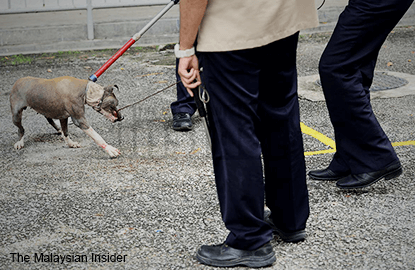
(Sept 25): The rabies outbreak in Bali in 2008 is not the same as the situation in Perlis, Kedah and Penang, said the veterinary department, after activists slammed the mass culling of canines here and said it would only aggravate the problem.
The department's deputy director-general (development) Datuk Dr Quaza Nizamuddin Hassan Nizam said for example, there were some half a million dogs in Bali, compared with the small number in the three states that recently reported an outbreak of rabies.
"That itself is a big difference. And, also in Bali, dogs are accepted as part of the community. But here, the situation is different. There is a lot of trepidation towards dogs in the Muslim community," he told The Malaysian Insider.
He said the argument that under-threat dogs would run into other territories, thus causing rabies to spread even more was not quite accurate.
"In places like Bali and even Thailand, they have these community dogs, which are the animals the people feed but not necessarily care for. They are not owned by anyone.
"But we don't have such dogs here in Malaysia. All we have are either strays or pets. So the situation is very different compared with places like Bali.
"It is quite a complex and detailed situation. People make very simplistic references to reflect what is happening here," Dr Quaza added.
Malaysia had been free from rabies since 1999, while the World Organisation for Animal Health declared the country rabies-free in 2012 but reports of the disease coming back started in August in the three northern states.
So far, more than 2,000 stray dogs have been culled in the three states, angering animal welfare groups which have urged the government to practise vaccination instead of killing.
They have criticised the ongoing culling in the three states, telling authorities that the approach will not effectively curb rabies but would make the situation worse.
There was no evidence, they added, that mass culling would stop the spread of rabies, adding that killing can potentially speed up the spread of the disease.
Urging the state governments to carry out mass canine vaccination, they said that even the World Health Organisation has stated that it was the most effective approach in dealing with rabies.
Lim Li Lian, a committee member of the group Stop Killing, Start Vaccinating, said the rabies outbreak in Bali was a case point.
"In 2008, Bali reported two isolated cases of rabid dog bites, just like Penang. The government had no money and there were no vaccines readily available. There was panic so strays were culled. The infection got worse and worse and by 2010, there were 10 people dying each week.
"Then Bali accepted help from an international organisation to conduct mass vaccination. In one year, the number of rabies cases was halved and by 2012, there were no more rabies cases.," she said.
Dr Quaza had said previously that culling stray dogs might not be the best solution to contain the outbreak of rabies but there was little choice left due to concerns about public health hazards with the spread of the disease.
He said this is because it is hard to differentiate between rabid dogs and those not affected.
Today, he reiterated that the department was closely monitoring the situation and hoped to curb the spread of the disease before it becomes a pandemic.
"There have been cases of human contracting rabies in those other countries. So far, we don't have that here. We are trying to contain it before it becomes chronic," he added. – The Malaysian Insider